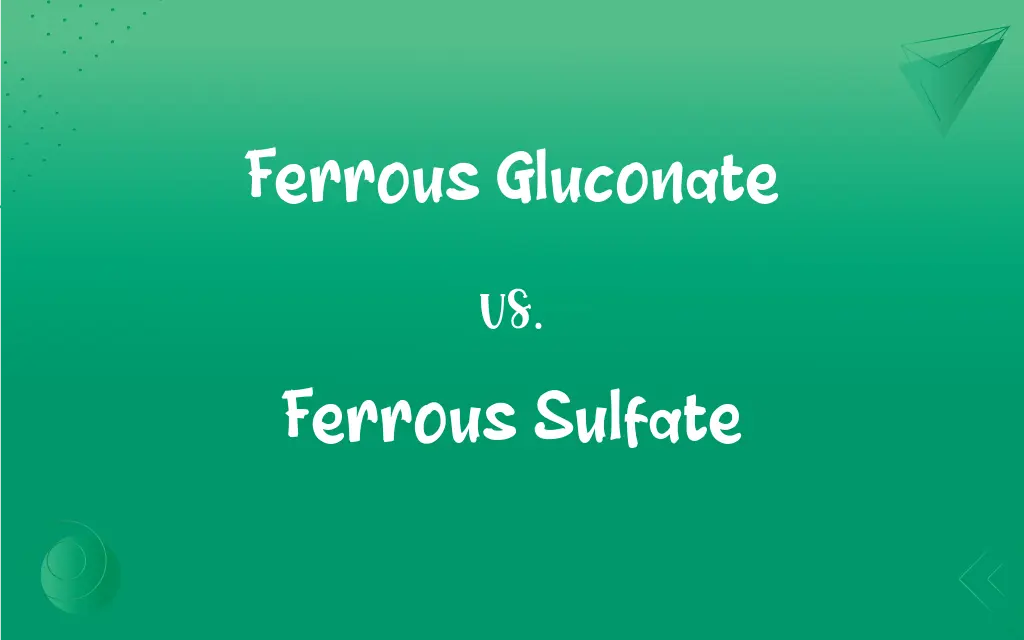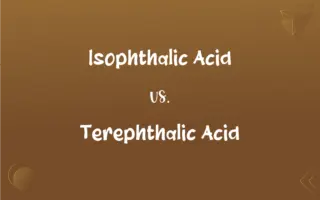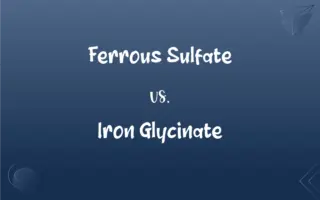Ferrous Gluconate vs. Ferrous Sulfate: What's the Difference?
Edited by Aimie Carlson || By Janet White || Published on January 11, 2024
Ferrous gluconate is a type of iron supplement, gentler on the stomach. Ferrous sulfate is another iron form, more common but may cause more stomach issues.

Key Differences
Ferrous gluconate is an iron supplement known for its relatively mild impact on the digestive system, making it a preferable choice for individuals with sensitive stomachs. Ferrous sulfate, another iron supplement, is more widely used but is known to potentially cause more gastrointestinal side effects.
In terms of iron content, ferrous gluconate contains a lower percentage of elemental iron, requiring larger doses to achieve the same effect as ferrous sulfate, which has a higher elemental iron content.
Ferrous gluconate is often recommended for those who have experienced side effects from other iron supplements, as it is gentler and less likely to cause constipation or nausea. Conversely, ferrous sulfate is a more traditional treatment for iron deficiency but can lead to more pronounced gastrointestinal discomfort.
The absorption rate of ferrous gluconate in the body is somewhat lower compared to ferrous sulfate, meaning it may take longer to correct iron deficiency. Ferrous sulfate is absorbed more efficiently by the body, making it a faster solution for treating anemia.
Ferrous gluconate is often more expensive than ferrous sulfate, reflecting its specialized formulation for increased stomach tolerance. In contrast, ferrous sulfate is generally more affordable and readily available, making it a common first-line treatment for iron deficiency.
ADVERTISEMENT
Comparison Chart
Gastrointestinal Impact
Gentler, less likely to cause stomach issues
May cause more gastrointestinal side effects
Elemental Iron Content
Lower percentage of elemental iron
Higher percentage of elemental iron
Recommended Usage
For those with sensitive stomachs or side effects from other supplements
Traditional treatment for iron deficiency
Absorption Rate
Lower absorption rate, slower effect
Higher absorption rate, quicker effect
Cost and Availability
More expensive, less commonly available
More affordable, widely available
ADVERTISEMENT
Ferrous Gluconate and Ferrous Sulfate Definitions
Ferrous Gluconate
An iron compound used to treat or prevent low blood levels of iron.
Doctors often prescribe ferrous gluconate for mild cases of anemia.
Ferrous Sulfate
A widely used and effective treatment for increasing hemoglobin.
Her doctor prescribed ferrous sulfate to increase her low hemoglobin levels.
Ferrous Gluconate
A form of iron supplement that is milder on the digestive system.
After experiencing stomach aches, she switched to ferrous gluconate for her iron supplementation.
Ferrous Sulfate
A common form of iron supplement used to treat iron deficiency.
Ferrous sulfate is often the first recommendation for treating iron deficiency anemia.
Ferrous Gluconate
A supplemental form of iron with lower elemental iron content.
Due to its lower iron content, ferrous gluconate requires larger doses.
Ferrous Sulfate
A more traditional iron supplement, though it may cause stomach issues.
While effective, ferrous sulfate sometimes causes gastrointestinal discomfort.
Ferrous Gluconate
An alternative iron source for those intolerant to harsher supplements.
He switched to ferrous gluconate after finding ferrous sulfate too harsh on his stomach.
Ferrous Sulfate
An iron salt with a higher concentration of elemental iron.
Due to its higher elemental iron content, ferrous sulfate can quickly improve iron levels.
Ferrous Gluconate
Iron salt derived from gluconic acid, used in iron supplementation.
Ferrous gluconate, being a salt of gluconic acid, is effective in raising hemoglobin levels.
Ferrous Sulfate
An affordable and readily available form of iron supplementation.
She chose ferrous sulfate for its affordability and easy availability at the pharmacy.
FAQs
Why choose ferrous gluconate over ferrous sulfate?
For reduced gastrointestinal side effects.
Is ferrous sulfate affordable?
Yes, it's generally more affordable than ferrous gluconate.
Can ferrous sulfate cause stomach issues?
Yes, it's known to potentially cause gastrointestinal discomfort.
Is ferrous gluconate available over-the-counter?
Yes, but it may be less commonly found than ferrous sulfate.
What is ferrous gluconate?
It's a milder iron supplement, gentler on the stomach.
Is ferrous sulfate more effective than ferrous gluconate?
It has higher elemental iron, so it may be more effective for severe deficiencies.
How long should one take ferrous sulfate?
As prescribed by a doctor, usually until iron levels normalize.
What is ferrous sulfate?
A common iron supplement with a higher elemental iron content.
Can ferrous gluconate cause constipation?
Less likely compared to ferrous sulfate, but possible.
How quickly does ferrous sulfate work?
It's absorbed quickly, making it effective for rapid treatment.
Is ferrous gluconate vegan?
It depends on the brand; some formulations are vegan-friendly.
How much elemental iron is in ferrous gluconate?
Less than in ferrous sulfate, requiring larger doses.
Who should take ferrous gluconate?
Those with sensitive stomachs or previous side effects from iron supplements.
Is ferrous gluconate safe during pregnancy?
Generally safe, but should be used under medical advice.
Can ferrous sulfate be taken with food?
Yes, but absorption is better on an empty stomach.
Are there alternatives to ferrous gluconate and ferrous sulfate?
Yes, there are other iron supplements like ferrous fumarate.
Can children take ferrous sulfate?
Yes, under medical supervision and in appropriate doses.
Can ferrous gluconate cure anemia?
It can help, especially in mild cases or maintenance therapy.
Do ferrous gluconate and ferrous sulfate have the same side effects?
They have similar side effects, but ferrous gluconate is typically milder.
Does ferrous sulfate interact with other medications?
Yes, it can interact with certain medications and supplements.
About Author
Written by
Janet WhiteJanet White has been an esteemed writer and blogger for Difference Wiki. Holding a Master's degree in Science and Medical Journalism from the prestigious Boston University, she has consistently demonstrated her expertise and passion for her field. When she's not immersed in her work, Janet relishes her time exercising, delving into a good book, and cherishing moments with friends and family.
Edited by
Aimie CarlsonAimie Carlson, holding a master's degree in English literature, is a fervent English language enthusiast. She lends her writing talents to Difference Wiki, a prominent website that specializes in comparisons, offering readers insightful analyses that both captivate and inform.






































































